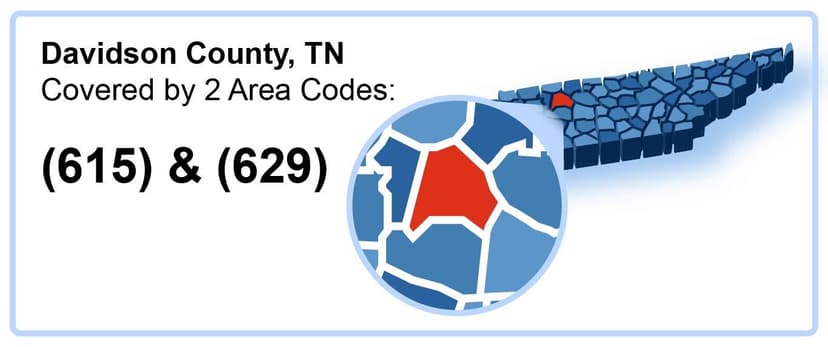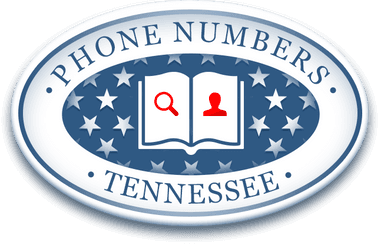What are Davidson County Area Codes?

The need for an improved telephone numbering and routing system brought about the creation of the North American Numbering Plan (NANP). The NANP created different Numbering Plan Areas (NPAs), each represented by a different area code. The area codes are placed at the beginning of telephone numbers as blocks of three digits, and they tell where phone numbers are registered. Area codes in Tennessee are under the management of the Tennessee Public Utilities Commission (TPUC), as required by the Federal Communications Commission (FCC).
The two area codes are currently in use in Davidson County are:
Area Code 615
Area code 615 was activated in 1954. It serves Davidson County and the surrounding counties. Davidson County communities covered by this area code include Nashville, Goodlettsville, Forest Hills, and Belle Meade.
Area Code 629
Area code 629 is a Tennessee telephone overlay code in the NANP. It was introduced in 2015 as an overlay for the 615 NPA.
What are the Best Cell Phone Plans in Davidson County?
Tennessee enjoys excellent coverage from the four major network operators. Verizon’s 98.9% coverage is the widest by any operator in Tennessee. AT&T and T-Mobile both cover about 98% of the state, while Sprint offers a respectable 86% coverage. Wireless and VoIP telephony services have surpassed traditional landlines as the primary means of telecommunications in Tennessee. A 2018 CDC survey observed that 61.2% of adults in the state exclusively used wireless phone services. This figure far outweighed the 3.7% of adults that are exclusively landline subscribers.
Voice over Internet Protocol (VoIP) routes telephone calls over broadband internet. Leveraging the immense capabilities of the internet, it offers diverse functions to subscribers. Business owners, attracted by the overall cost-effectiveness, lead the switch to VoIP. A 2018 FCC report showed that VoIP currently has more active subscribers than the traditional landlines nationwide.
What are Davidson County Phone Scams?
Phone scams are the schemes fraudsters use to extort money and retrieve personal information from Davidson County residents over the phone. Phone calls and text messages can help criminals gain access to their potential victims. The Consumer Affairs Division of the Attorney General’s Office in Tennessee highlighted common phone scams prevalent in the state. The identified scams include:
What are IRS Scams?
These scams involve fraudsters posing as Internal Revenue Service (IRS) officials and calling to threaten residents with arrest over unpaid taxes. They are more rampant during the tax season when Davidson County residents file their tax returns. The IRS does not initiate contact with tax offenders via the telephone. Authorities advise Davidson County residents to request for the name, badge number, and callback number of supposed IRS officials that call them. After receiving the information, they are to dial 1 (800) 366-4484 to confirm the authenticity of the call from the IRS. Send an email to the IRS to complain about any IRS scam incidents or use the FTC online complaint assistant.
What are Grandparent Scams?
Scammers target elderly Davidson County residents and call them while claiming to be their grandchildren. These impersonators cook up distress situations and ask for urgent financial assistance from their targets. Other times, they pose as law enforcement agents and convince targets to post the bails for their grandchildren, who are supposedly in their custody. Perform a reverse phone lookup to get details on an unknown number’s owner, as this can prevent this scam. Report grandparent scams by using the consumer complaint assistant of the FTC.
What are Charity Scams?
These scams get more frequent after natural disasters. Fraudsters solicit funds on behalf of charities and divert the donations they receive to their accounts. These criminals avoid answering any inquiries made about their missions, how the donations will be used, and the deductible taxes on the donations. Phone number lookups by name, number, and address can provide information on the authenticity of these charities. Authorities direct Davidson County residents to always verify the registration status of any charity before making donations. Dial (615) 741-4737 to report charity scams to the Consumer Affairs Division or file an online complaint.
What are Lottery Scams?
Scammers notify residents about winning lotteries and sweepstakes, usually from foreign countries, and request processing fees or taxes before the prizes can be redeemed. Residents need not be entered for lotteries before being targeted by these scammers. These fraudsters also try to obtain banking details of targets under the guise of requiring them to process payments. Do not share your personal information with an unknown individual over a phone call. A quick phone number search can help find information on a phone number used in this scam. Report lottery scams to the FTC by using the consumer complaint assistant.
What are Tech Support Scams?
Scammers extort money and steal personal information through these scams by deceiving residents into granting them remote access to their computers. The criminals introduce themselves as staff of major tech companies and trick residents into believing their machines need repair. They ask the targets for remote access to their computers to effect these repairs. Granting them remote access gives them the opportunity to install malware to retrieve personal information and extort victims for the phony repairs. Do not accept offers to repair your electronic devices from unsolicited callers. Always confirm the identities of representatives sent by tech companies before granting physical access to these devices. Report tech support scams to the FTC’s online consumer complaint assistant.
What are Advance Fee Loan Scams?
These scams target residents with poor credit histories who are usually ineligible for loans. Scammers call these targets and promise them guaranteed loans, even with their low credit ratings. The fraudsters also offer total debt cancellations and other benefits to entice their victims. However, to receive these offers, the targets must pay upfront processing fees. If the victims fall for this scam and pay the requested amounts, the scammers take the money and disappear without rendering the promised services. Reverse number lookups can retrieve information on the phone numbers used to perpetrate these scams. Davidson County residents should beware of lenders that promise guaranteed loans regardless of their credit histories. Use the consumer complaint assistant of the FTC to lodge complaints.
What are Robocalls and Spam Calls?
Robocalls are pre-recorded messages delivered to Davidson County residents through phone calls placed by automated machines. Automated dialing machines place multiple random calls to residents and relay the recorded messages once recipients pick the calls. Robocalls are legitimate telemarketing tools that have been abused by scammers, who deploy them to commit phone scams. This has led to spikes in the numbers of robocalls received by county residents.
To curtail robocalls abuse, government agencies and private companies deployed several measures. The Tennessee Do-Not-Call Telephone Sales Solicitation Law and Telephone Robocall Abuse Criminal Enforcement and Deterrence (TRACED) Act got passed at the state and federal levels. These laws specifically target illegal robocalls and spell out severe punishments for robocall abusers. Phone manufacturers try to curb spam calls by offering tools that detect and block suspected spam calls in mobile phones. Davidson County residents can activate these functions to reduce robocall abuse. Telephone carriers also offer call filtering and call blocking tools to their subscribers.
Take these steps to reduce robocalls frequency:
- Do not answer calls from unknown or suspicious numbers. Redirect such calls to your voicemail box and call back those that left messages. You can ignore the numbers that did not.
- Secure your voicemail against hacking through spoofed numbers by setting up a password.
- End telephone calls that turn out to be robocalls. Do not push any other buttons as instructed by the voice messages to avoid more robocalls.
- Make inquiries and identify the most suitable call filtering and call blocking service provided by your network operator.
- Download third-party call blocking apps and use them to identify and block robocall numbers.
- Register on the National Do Not Call Registry and Tennessee Do Not Call Register. Legitimate telemarketers will not call numbers on the list.
- Report persistent robocall abuse to the FTC.
How to Spot and Report Davidson County Phone Scams?
To help prevent Davidson County residents from falling victims to phone scams, the FTC highlighted some red flags that point to possible scam transactions. Residents should be wary of phone calls that involve the following:
- Payment requests to redeem prizes allegedly won are scams. The criminals claim the requested payments are for clearance taxes or processing fees.
- Calls threatening arrest and other punitive measures over unpaid taxes or utilities are scams. Legitimate organizations do not initiate contact with defaulters via phone calls.
- Investment opportunities that are overly attractive and require immediate funding are usually scams. The time constraints imposed by the callers are to give the targets no time to do thorough research or seek opinions from third parties.
- Unsolicited calls from government officials or financial institutions seeking confirmation of personal information are dubious. Do not reveal your personal information to any individual or agency on a call you did not initiate.
- Insistence on unusual payment methods, such as gift cards, pre-loaded debit cards, and wire transfers point to potential scams. Scammers prefer these means of payments because funds sent through them are hard to trace and recover.
Several government agencies educate and sensitize residents on various forms of phone scams devised by fraudsters. Understanding how these scams work helps citizens avoid becoming victims. Davidson County residents get scam alerts periodically and can report incidents of phone scams to these agencies:
Local Authorities
The Metropolitan Nashville Police Department (MNPD) serves Nashville and the entire Davidson County. The Department’s Criminal Investigations Division investigates scams and provides scam alerts to residents. Report scams to the Criminal Investigations Department by dialing (615) 862-7560.
State Departments
Within the Tennessee Attorney General’s Office is the Consumer Protection Division that houses the Division of Consumer Affairs. The Division of Consumer Affairs identifies prevalent scams in the state and educates residents on avoiding them. The Attorney General’s Office also receives reports on scams online or on (615) 741-4737.
To verify the authenticity of charities soliciting for funds, the Tennessee Secretary of State’s Office created a database accessible online by Davidson County residents and all Tennessee citizens. For further inquiries on charity organizations, send an email to the Secretary of State’s Office or call (615) 741-2555.
The Tennessee Public Utility Commission (PUC) is in charge of the Tennessee Do Not Call Register. Adding your phone number to this list keeps away legitimate telemarketers and helps keep robocalls to a minimum. Davidson County residents can also register to be on this list by dialing 1 (877) 872-7030 from the phone number they wish to include on the register.
Federal Agencies
The Federal Communications Commission (FCC) regulates the telecommunications industry. It provides guidelines on how to identify spoofing and activate call blocking to help residents avoid scams. In conjunction with telephone carriers, the FCC seeks ways to improve caller authentication and eradicate caller ID spoofing. Report spoofing and other phone scams to the FCC.
The Federal Trade Commission (FTC) promotes fair practices in the market and protects consumer interests. They provide instructions that help residents identify common phone scams and avoid robocalls. The FTC manages the National Do Not Call Registry, which directs telemarketers not to disturb you if your phone number is on the register. Report any phone scam incident to the FTC by using the online consumer complaint assistant.
